
Plant-based diet for beginners: Food, Supplements, and Workout Tips


Plant-based diet for beginners: Food, Supplements, and Workout Tips
How to Do a Plant-based Diet for Beginners
First, let’s cover how NOT to do a plant-based diet: eating too many processed foods and paying attention to your biofeedback, genes, and ancestral heritages.
To do a plant-based diet right, consider including the following foods regularly if they don’t cause reactions or fluctuations.

Foods to Include regularly
Vegan Food List
The definition of a vegan or plant-based diet means that you exclude all animal products (e.g., meat, fish, seafood, dairy, and eggs). You can eat any food in the following categories:
- Vegetables
- Fruits
- Legumes and lentils
- Mushrooms and fungi
- Grains
- Pseudograins (such as quinoa)
- Nuts
- Seeds
- Marine plants (such as seaweed)
- Fats (such as oils from avocados)
Example of a Vegan Diet
Here are some examples of breakfast, lunch, and dinner so you get a good feel for your menu.
Breakfast:
Superfood Oatmeal
Lunch:
Spring Salad with Raspberry Vinaigrette
Dinner
Spicy Pad Thai Veggie Noodles
You can find these recipes in our Plant-Based Superfood Delights Cookbook—there are many more delicious vegan meals.
What Are the Different Types of Vegetarian Diets?
Some terms can be confusing, so the different types of vegetarian diets are listed below:
- Lacto-vegetarian: Eats all plant-based foods as well as dairy products
- Ovo-vegetarian: Eats all plant-based foods as well as eggs
- Pescatarian: Eats mainly plant-based foods, as well as dairy products, eggs, and fish
These mainly change protein sources. And when you’re vegetarian or vegan, protein can be a big deal.
Plant-based Protein Sources
While it’s possible to get all the proteins you need from plant-based sources, you need enough protein intake to maintain all three sides of your BiOptimization triangle.
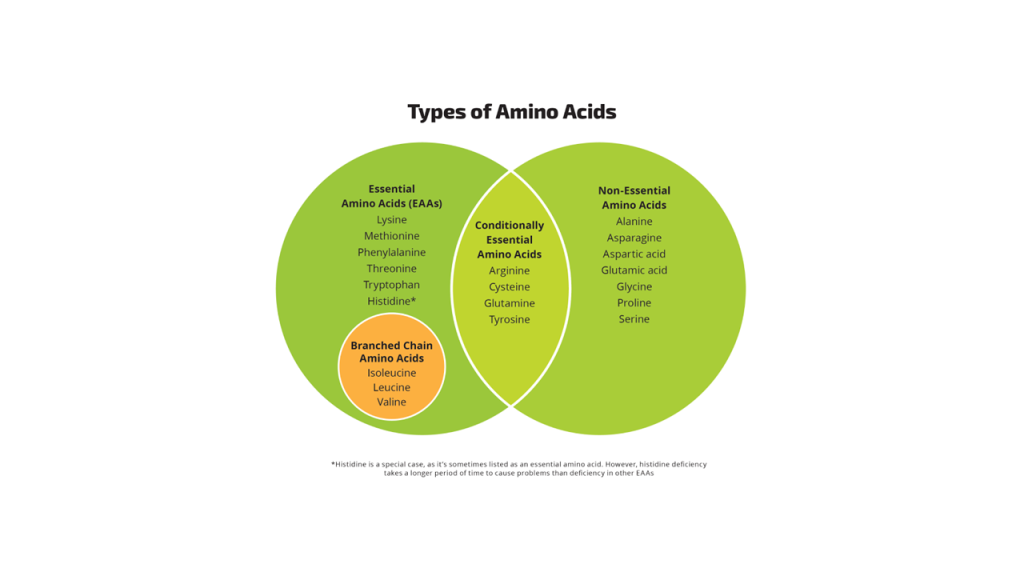
You need all 20 amino acids to build muscles and construct other proteins in your body.
Some plant-based protein sources provide complete proteins or a relatively well-rounded combination of amino acids. These include:
- Hemp protein
- Pea protein
- Pumpkin protein
- Soy and soy products
- Buckwheat
- Quinoa
- Potatoes
- Chia seeds
- Spirulina
- Spinach
- Quorn (protein from fungi)
Determining the Ideal Macronutrients for Vegetarians and Vegans
You don’t need as much protein as the classic bodybuilders are eating, but you do need regular servings of high-quality protein. I recommend starting with 20-30% of protein.
With protein powder, you can allocate about 20-40% of your daily calorie intake to fats and carbs each, depending on your goals and biofeedback.
Also, it’s a good idea to pay attention to the seasons and climate and plan your meal plan around the changes. Because the chances of blood sugar irregularities are highest in the summer, it might be a good idea to eat more carbs and more fats in the winter.
What I Learned as a Vegan Bodybuilder & Why That’s Important to Every Vegan & Vegetarian

The 1g of Protein/lb of Bodyweight Myth
There is a myth among bodybuilders that you must consume 1 g of protein/lb of body weight to maintain muscles as a professional bodybuilder. When I switched to a plant-based diet, getting 1 g/lb daily was almost impossible without using protein powders.
Once I healed my gut microbiome and lining and supercharged my digestion with MassZymes, I only needed 85-100 grams of high-quality protein to recover and maintain muscle mass. I prepped for Mr. Universe with 80 grams of plant-based protein.
For those who are into building lean muscle mass and weight loss, I strongly advise using MassZymes or VegZymes with it. A good target for someone with those goals is 0.7 g/lb.
Those experienced with a plant-based diet can use a vegan or vegetarian protein powder to make their macros. Check out our 100% plant-based Protein Breakthrough. It tastes amazing and will help you hit your macro goals.
Expect Adjustments
As with any diet, it may take time for your microbiome to adjust to the sudden change in eating habits. You’re eating much more fiber and plant matter than you’re used to. Just remember to be patient, and that short-term discomfort doesn’t necessarily mean a plant-based diet isn’t for you—give it some time.
Avoid the Vigilante Veganism Mindset
You’ve undoubtedly encountered vigilante vegans or keto zealots—people so passionate about their diets that they miss that the diet isn’t a good fit for them. Try to avoid this pitfall.
Health Benefits of Vegan and Vegetarian Diets
Many aspects of vegan and vegetarian diets are the perfect antidote to the harmful effects of the Standard American Diet (SAD). As a result, many people experience significant improvements in their health and body composition when they switch to a plant-based diet.
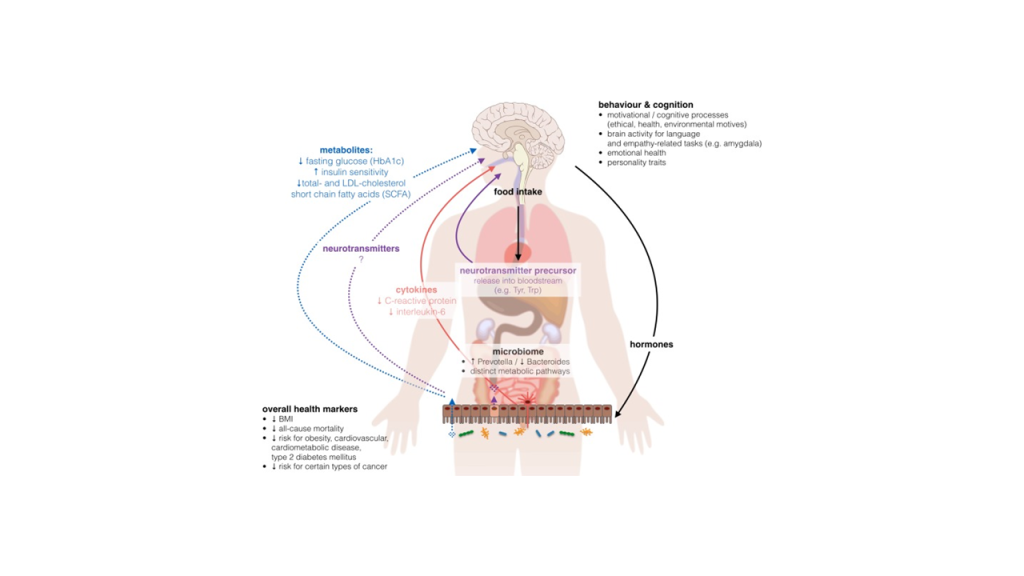
1. Beneficial Shifts in the Gut Microbiome
A Harvard University study looked at vegetarian and carnivore diets for five days. Compared to the meat-based diet, the plant-based diet grew more firmicutes that fermented the fibers and increased the overall community diversity of the gut flora.
2. Increase in Dietary Fiber
Many modern diseases are caused by a lack of dietary fiber because most people don’t eat enough plants. While studies show modern-day humans, consume a maximum daily amount of 30/g fiber, our ancestors consumed over 100/g per day of dietary fiber.
How a High-fiber Plant-based Diet Improves Your Health
- Binds up and eliminates toxins
- Improves satiety and blood sugar control
- Feeds your gut bacteria and creates postbiotics
A high-fiber diet allows good bacteria to thrive. The bacteria then ferment the fiber into beneficial postbiotics, such as :
- Short-chain fatty acids
- Cellular components of bacteria cells
- Neurotransmitters, hormones, and their metabolites
- Secondary bile acids

Among all postbiotics, butyrate is the most studied and beneficial. Some benefits of butyrate include:
- Boosts mitochondria function, balances the immune response and activates gut repair epigenetics
- Used as an antifungal and antimicrobial
- Helps with blood sugar control and excessive weight gain
- inhibits cancer formation, especially colon cancer
Health benefits of dietary fiber intake
The highest fiber intake is great for your gut, as it is associated with a reduced prevalence of:
- Esophageal cancer
- Gastroesophageal reflux disease (GERD)
- Gastric cancer
- Ulcers
- Gallbladder diseases
- Constipation
- Hemorrhoids
3. Increase in Phytonutrients, Vitamins, & Minerals
Focusing on fruits and vegetables will give you more phytonutrients, vitamins, and minerals.
Potential benefits of phytonutrients and polyphenols include :
- Improves your gut microbiome composition
- Supports and protects your mitochondria
- Protects your cells from oxidative stress
- Balances your immune system
- Supports hormone balance
- Supports your detoxification pathways
- Promotes autophagy, which has a potent anti-aging and anti-inflammatory effect
Plant-based diets are high in nutrients, such as magnesium, vitamin C, vitamin E, folate, and niacin.
Potential benefits of phytonutrients and polyphenols include :
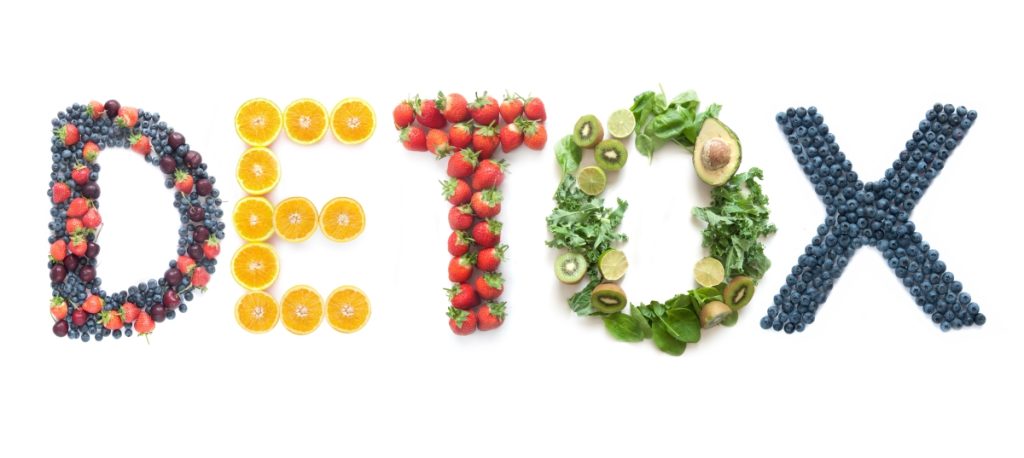
4. Reduce Insulin Growth Factor (IGF-1)
Insulin growth factor (IGF-1) is a hormone that, overall, promotes growth. But having too much of it can promote diseases of excessive tissue growth, such as cancer, endometriosis, and excessive weight gain. Dairy proteins, in particular, increase insulin and IGF-1, so if you do a Lacto-vegetarian diet, you may not reap these benefits.
5. Reduce Toxins from Food
Toxins such as pesticides, heavy metals, antibiotics, and pollutants tend to bioaccumulate the food chain, and they are consumed by animals. These toxins can be passed through a carnivorous diet, so a plant-based diet supports toxins reduction.
6. Reduce Processed Foods
Cooking whole foods from scratch means avoiding processed foods containing additives and extra sugar and sodium. Just take caution with processed “vegan snacks.”
7. Increase in Enzymes
A plant-based diet means you consume more digestive and systemic enzymes. These digestive enzymes’ benefits include maximizing digestion and reducing inflammation.
Health Risks of a Vegetarian and Vegan Diet (And How to Thrive Despite Them)
While there are many positives to a plant-based diet, it simply doesn’t work for some people. As you begin any diet, pay attention to your biofeedback, such as your energy, bowel movements, skin health, blood sugar response, triglycerides, and nutrient levels. Make sure to have blood work drawn, as long-term nutrient deficiencies can lead to serious health problems.
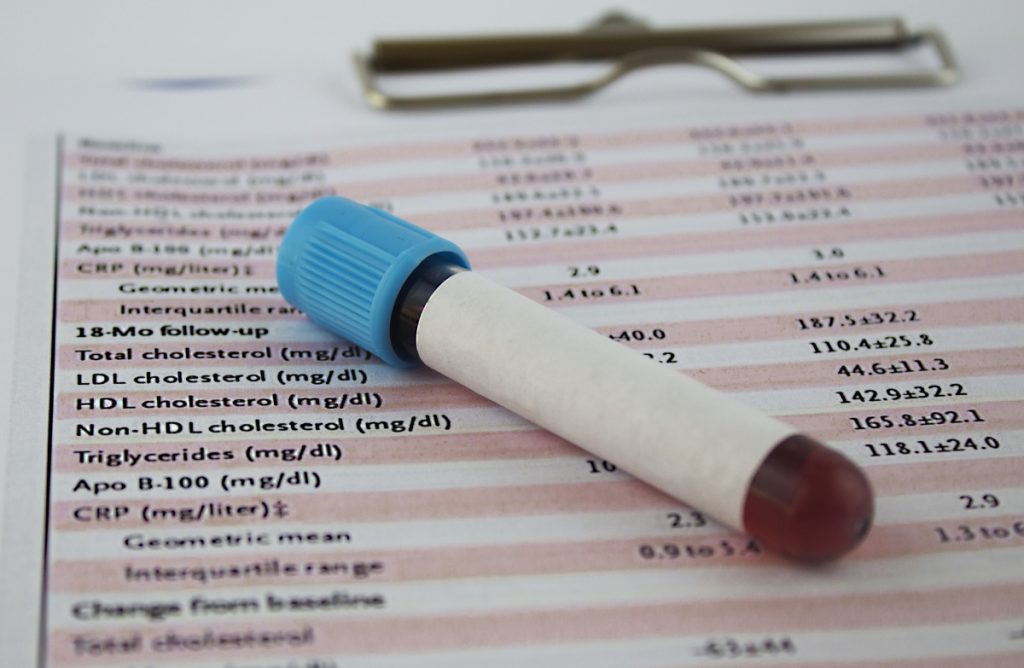
The following symptoms are markers for nutritional deficiencies, which should be investigated:
- Symptoms of anemia (e.g., fatigue despite getting enough sleep, malaise, and paleness)
- Hair loss
- Reduced immune function (e.g., frequent colds and flu, poor wound healing)
- Dry skin or skin breakouts
- Brain fog, reduced cognitive function, and mood problems
- Muscle loss
- Body fat gain
- Joint pain and other inflammatory symptoms
- Reduced appetite, bloating, and poor digestion
- Reduced sex drive and overall vitality
- Poor sleep or reduced sleep quality
Troubleshooting for Vegans and Vegetarians
Be aware of these common nutrient deficiencies in vegans and vegetarians :
- Protein
- Zinc
- Preformed Vitamin A (retinol)
- Vitamin D
- Iodine
- Selenium
- Vitamin B12
- Iron
It’s a good idea to routinely test for these nutrient levels with the SpectraCell test and supplement if needed.
Why Vegetarians and Vegans Develop Deficiencies
Zinc deficiencies are common in vegans and vegetarians because zinc is more bioavailable on a carnivorous diet.
Zinc deficiencies and the lack of meat tend to lower stomach acid, reducing the absorption of key minerals, such as iron, magnesium, and vitamin B12. It’s important to support your stomach acid levels with HCL Breakthrough and take steps to reduce your food’s antinutrient content.
1. Protein Deficiency: Muscle Mass & Brain Function
Many vegans and vegetarians don’t even come close to consuming enough protein, which can result in loss of muscle mass and brain function. I recommend supplementing with a completely plant-based protein powder, such as Protein Breakthrough, to help[ prevent protein deficiencies.
Vegan diets can also be low in the following nutrients:
- Choline
- Creatine
- Carnitine
- Cholesterol
2. Antinutrients and Gut Irritants
Antinutrients and gut irritants can be found in plants; some people are susceptible to this irritation. Substances to be aware of include:
- Phytates
- Tannins
- Protease inhibitors
- Oxalates
- Goitrogens
- Lectins
In particular, being sensitive to lectins may make it difficult to adhere to a plant-based diet. Some people, however, can maximize protein digestion with MassZymes and ensure that their lectin-containing foods are cooked properly.
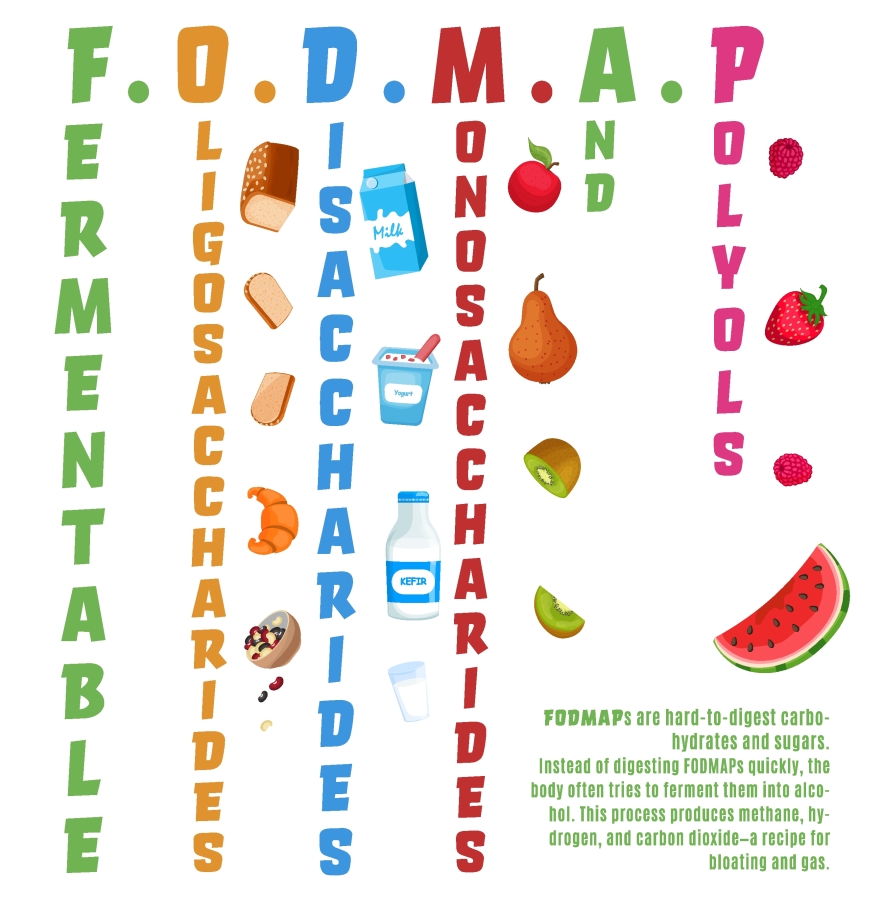
FODMAPs
Fermentable oligosaccharides, disaccharides, monosaccharides, and polyols (FODMAPs) are fermentable fibers that are poorly absorbed in the gut. Sensitivity to FODMAPs can include abdominal discomfort and symptoms of bowel irregularities.
There is much discussion over whether a low-FODMAP diet is beneficial, as it can starve the “good” gut bacteria. The best strategy is to do the BiOptimized Gut Health test to see which type of plants are optimal for your digestive system.
3. How to Thrive on a Plant-based Diet Despite Antinutrients
Because of the antinutrients in plants, it’s a good idea to keep an eye on your absorption and levels. Some things that can help balance the antinutrients out include:
- Using digestive support (e.g., VegZymes are designed to optimize the breakdown of plants)
- Paying attention to nutrient forms to maximize absorption (e.g., fulvic and humic acid can greatly improve mineral absorption), so we incorporate these in Primergen and Magnesium Breakthrough
- Eating fermented foods, such as real yogurt, kimchi, sauerkraut, etc.
- Biomimicking food preparations by soaking, rinsing, sprouting, fermenting, and cooking
References
- Muegge BD, Kuczynski J, Knights D, et al. Diet drives convergence in gut microbiome functions across mammalian phylogeny and within humans. Science. 2011;332(6032):970-974. doi:10.1126/science.1198719
- Eaton SB. The ancestral human diet: what was it and should it be a paradigm for contemporary nutrition? Proc Nutr Soc. 2006;65(1):1-6. doi:10.1079/pns2005471
- Wegh CAM, Geerlings SY, Knol J, Roeselers G, Belzer C. Postbiotics and their potential applications in early life nutrition and beyond. Int J Mol Sci. 2019;20(19):4673. doi:10.3390/ijms20194673
- Martin AM, Sun EW, Rogers GB, Keating DJ. The influence of the gut microbiome on host metabolism through the regulation of gut hormone release. Front Physiol. 2019;10:428. doi:10.3389/fphys.2019.00428
- Galland L. The gut microbiome and the brain. J Med Food. 2014;17(12):1261-1272. doi:10.1089/jmf.2014.7000
- Clark A, Mach N. The Crosstalk between the Gut Microbiota and Mitochondria during Exercise. Front Physiol. 2017;8:319. doi:10.3389/fphys.2017.00319
- Furusawa Y, Obata Y, Fukuda S, et al. Commensal microbe-derived butyrate induces the differentiation of colonic regulatory T cells. Nature. 2013;504(7480):446-450. doi:10.1038/nature12721
- Peng L, He Z, Chen W, Holzman IR, Lin J. Effects of butyrate on intestinal barrier function in a Caco-2 cell monolayer model of intestinal barrier. Pediatr Res. 2007;61(1):37-41. doi:10.1203/01.pdr.0000250014.92242.f3
- Roshanravan N, Mahdavi R, Alizadeh E, et al. Effect of butyrate and inulin supplementation on glycemic status, lipid profile and glucagon-like peptide 1 level in patients with type 2 diabetes: A randomized double-blind, placebo-controlled trial. Horm Metab Res. 2017;49(11):886-891. doi:10.1055/s-0043-119089
- Gao Z, Yin J, Zhang J, et al. Butyrate improves insulin sensitivity and increases energy expenditure in mice. Diabetes. 2009;58(7):1509-1517. doi:10.2337/db08-1637
- Wu X, Wu Y, He L, Wu L, Wang X, Liu Z. Effects of the intestinal microbial metabolite butyrate on the development of colorectal cancer. J Cancer. 2018;9(14):2510-2517. doi:10.7150/jca.25324
- Clarys P, Deliens T, Huybrechts I, et al. Comparison of nutritional quality of the vegan, vegetarian, semi-vegetarian, pesco-vegetarian and omnivorous diet. Nutrients. 2014;6(3):1318-1332. doi:10.3390/nu6031318
- Beane KE, Redding MC, Wang X, et al. Effects of dietary fibers, micronutrients, and phytonutrients on gut microbiome: a review. Appl Biol Chem. 2021;64(1). doi:10.1186/s13765-021-00605-6
- Schüpbach R, Wegmüller R, Berguerand C, Bui M, Herter-Aeberli I. Micronutrient status and intake in omnivores, vegetarians and vegans in Switzerland. Eur J Nutr. 2017;56(1):283-293. doi:10.1007/s00394-015-1079-7
- Forster R, Sarginson A, Velichkova A, et al. Macrophage-derived insulin-like growth factor-1 is a key neurotrophic and nerve-sensitizing factor in pain associated with endometriosis. FASEB J. 2019;33(10):11210-11222. doi:10.1096/fj.201900797R
- Lewitt MS, Dent MS, Hall K. The insulin-like growth factor system in obesity, insulin resistance and type 2 diabetes mellitus. J Clin Med. 2014;3(4):1561-1574. doi:10.3390/jcm3041561
- Kristensen NB, Madsen ML, Hansen TH, et al. Intake of macro- and micronutrients in Danish vegans. Nutr J. 2015;14(1):115. doi:10.1186/s12937-015-0103-3
- Winkler J, Ghosh S. Therapeutic potential of fulvic acid in chronic inflammatory diseases and diabetes. J Diabetes Res. 2018;2018:5391014. doi:10.1155/2018/5391014
